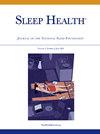婴儿的就寝时间和午睡时间:与家庭睡眠结果的关系。
IF 3.4
2区 医学
Q2 CLINICAL NEUROLOGY
引用次数: 0
摘要
目的:固定的就寝时间与幼儿更好的睡眠和健康有关。本研究的目的是探讨婴儿就寝时间和午睡时间的普遍性,以及它们与婴儿和父母睡眠结果的关系。方法:135例1-15周龄婴幼儿的父母(67%为母亲,33%为父亲);M = 8.2周)完成了一份关于婴儿睡眠规律和模式的在线问卷(《婴儿睡眠简易问卷-修订版》),以及父母的睡眠(PROMIS睡眠障碍量表;睡眠相关障碍量表)。结果:总体而言,62%的人表示他们的婴儿有睡前习惯,20%的人有午睡习惯。有规律就寝时间的婴儿不太可能被抱着睡觉,一夜之间睡得更久,夜间醒来的时间更短,这些父母的睡眠障碍减少了。给孩子设定了就寝时间的父母认为,与那些没有为孩子设定就寝时间的父母相比,这种习惯更能帮助孩子入睡并保持睡眠状态,而且更有可能相信这有助于他们与孩子建立联系。给孩子安排午睡时间的父母报告说,他们喜欢这样做,并相信他们的做法比那些没有与白天睡眠模式有任何其他联系的父母更能帮助孩子入睡。结论:睡眠习惯很受欢迎,易于实施,并且被认为有助于睡眠和联系。睡前习惯也与婴儿更好的睡眠巩固和父母更少的睡眠障碍有关。儿科医生提出的一个简单的建议,即为年幼的婴儿制定睡眠常规,可能会改善家庭睡眠结果。本文章由计算机程序翻译,如有差异,请以英文原文为准。
Bedtime and naptime routines for young infants: Associations with family sleep outcomes
Objectives
A bedtime routine is associated with better sleep and well-being in young children. The aim of this study was to explore the prevalence of bedtime and naptime routines in young infants and their association with sleep outcomes in both the babies and parents.
Methods
Parents (67% mothers, 33% fathers) of 135 young infants (1-15 weeks; M = 8.2 weeks) completed an online questionnaire about infant sleep routines and patterns (Brief Infant Sleep Questionnaire—Revised), as well as parent sleep (PROMIS Sleep Disturbance Scale; Sleep-related Impairment Scale).
Results
Overall, 62% reported having a bedtime routine and 20% a naptime routine for their young infant. Babies with a bedtime routine were less likely to be held to sleep, slept for longer stretches overnight, and had shorter nighttime awakenings, with those parents having decreased sleep disturbance. Parents with a bedtime routine for their baby believed the routine helped their baby fall and stay asleep more than those without, and were more likely to believe it helped them bond with their baby. Parents with a naptime routine for their baby reported liking it and believed what they did helped their baby sleep more than those without, without any other associations with daytime sleep patterns.
Conclusions
Sleep routines were well-liked, easy to implement, and perceived as helpful for sleep and bonding. Bedtime routines were also associated with better baby sleep consolidation, and fewer sleep disturbances in parents. A simple recommendation of instituting sleep routines for young infants by pediatricians may result in improved family sleep outcomes.
求助全文
通过发布文献求助,成功后即可免费获取论文全文。
去求助
来源期刊

Sleep Health
CLINICAL NEUROLOGY-
CiteScore
6.30
自引率
9.80%
发文量
114
审稿时长
54 days
期刊介绍:
Sleep Health Journal of the National Sleep Foundation is a multidisciplinary journal that explores sleep''s role in population health and elucidates the social science perspective on sleep and health. Aligned with the National Sleep Foundation''s global authoritative, evidence-based voice for sleep health, the journal serves as the foremost publication for manuscripts that advance the sleep health of all members of society.The scope of the journal extends across diverse sleep-related fields, including anthropology, education, health services research, human development, international health, law, mental health, nursing, nutrition, psychology, public health, public policy, fatigue management, transportation, social work, and sociology. The journal welcomes original research articles, review articles, brief reports, special articles, letters to the editor, editorials, and commentaries.
 求助内容:
求助内容: 应助结果提醒方式:
应助结果提醒方式:


